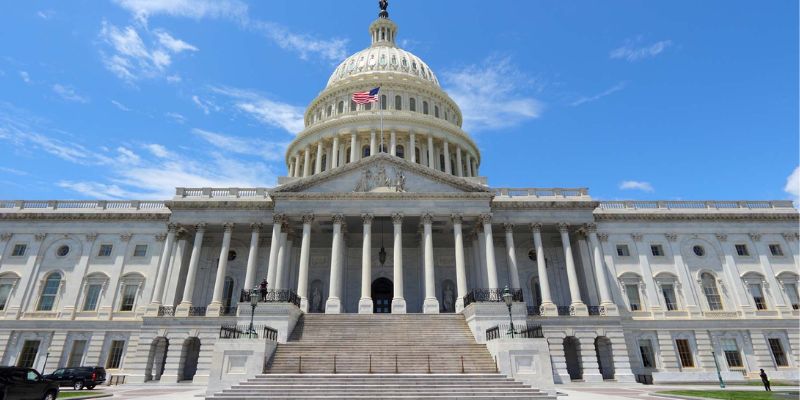
It's no secret that the US debt ceiling talks have dominated the headlines recently, but many people may not realize they could directly impact their mortgage rates. As we all know, decisions made in Washington often influence our day-to-day lives, and the same holds regarding our mortgages.
We'll explore how the current negotiations over raising America's debt limit might affect your ability to get a lower interest rate on your home loan and what you should do now if you're currently shopping for a loan.
What is the US Debt Ceiling, and Why Does it Matter to us as Homeowners

The US debt ceiling is a legal limit on how much the federal government can borrow to finance its operations. The current debt ceiling was set in 2011 and had been creeping closer to its limit ever since.
With Congress unable to agree on raising the debt ceiling, this could lead to a default situation where the government wouldst bey its bills, and interest rates could go up significantly.
The Debt Ceiling's Impact on Mortgage Rates

The US debt ceiling affects mortgage rates because they influence the availability of money in the market and the cost at which lenders can borrow funds. When it comes to mortgages, lenders may not be able to offer as competitively low-interest rates as they normally would.
If you're looking for a home loan right now, you might find yourself paying more than usual for your loan due to the uncertainty caused by the debt ceiling negotiations.
How will the US Debt Ceiling Talks Affect Mortgage Rates in the US?
If Congress cannot agree on raising the debt ceiling, this could mean that mortgage interest rates will go up. When the government needs money, it often borrows from private lenders, which drives demand and raises interest rates.
If there is a default situation where the government cannot pay its bills, then it's likely that mortgage rates will go up significantly as well. This could mean that people looking to purchase a home or refinance an existing mortgage may need help to get a competitive rate.
What Happens to Mortgage Rates if the Debt Ceiling is Raised?
This will be good news for mortgage rates if Congress agrees and raises the debt ceiling. Higher limits on government borrowing mean that the cost of funds available in the market will remain low, keeping interest rates at competitive levels. This means it may be easier for borrowers to access loans with lower interest rates.
The US debt ceiling talks can significantly impact mortgage rates in America. With interest rates likely to go up if no agreement is reached, homeowners need to pay close attention to these negotiations and keep their eyes open for any changes that might affect their ability to get a good deal on their home loan.
What Happens to the Housing Market if the US Defaults on Debt?
If the US defaults on its debt, it could have serious ramifications for the housing market. This is because a default would lead to higher interest rates, which could make it more difficult for people to afford mortgages and other home loans.
It could also cause investors in mortgage-backed securities to lose confidence in the market, leading them to pull back their investments. This could further reduce liquidity in the housing market, making it harder for potential buyers to find financing.
Pros of Keeping or Raising the Debt Ceiling
Prevents Default
Keeping or raising the debt ceiling will help prevent a default situation where the federal government cannot pay its bills. This could have devastating economic implications, so keeping the debt ceiling at an appropriate level is important to avoid this.
Keeps Interest Rates Low
Raising the debt ceiling helps keep interest rates low since lenders are more likely to lend money when they know their loans will be repaid. This helps keep mortgage and other loan rates low, making them more accessible and affordable for consumers.
Ensures Access to Credit
The US debt ceiling talks also affect access to credit since lenders are less likely to extend lines of credit or issue loans when uncertain about the nation's ability to pay its bills. Keeping or raising the debt ceiling helps lenders feel more secure and confident in extending credit which can help consumers access the financing they need.
Reduces Debt Burden
Keeping or raising the debt ceiling allows the federal government to borrow more money to finance its operations. This helps reduce the long-term debt burden on taxpayers since future generations won't have to shoulder as much of it.
Maintains Fiscal Stability
Raising or maintaining the debt ceiling also helps maintain fiscal stability by ensuring that government spending does not exceed what is available in its coffers. This helps reduce the risk of an economic crisis or recession since it limits the money borrowed to fund operations.
Cons of keeping or raising the debt ceiling
Increases National Debt
Raising the debt ceiling allows the federal government to borrow more money, which can increase the total amount of national debt. This can burden future generations, who will be responsible for paying back this debt through taxes and other fees.
Restricts Government Spending
An increase in the debt ceiling also restricts government spending since it limits how much money is available to fund operations. This could lead to reduced services or cuts in areas like education, healthcare, and infrastructure, further limiting economic growth.
Can Increase Interest Rates
If Congress fails to raise or keep the debt ceiling at an appropriate level, it could lead to higher interest rates for consumers since lenders are less likely to lend money if they fear the nation is too deep in debt.
Can Lower Credit Ratings
A failure to raise or maintain the US debt ceiling can also lead to a lower credit rating for the nation, making it more difficult for the federal government to borrow money at competitive rates. This would further increase the burden on taxpayers, who may pay higher interest rates when borrowing from other countries.
FAQS
What are US mortgage rates based on?
US mortgage rates are based on various factors, including the current interest rate environment, economic conditions, and the overall supply and demand for mortgage-backed securities. The Federal Reserve's federal funds rate is also important in determining mortgage rates. Mortgage lenders usually consider the prime rate when setting their rates for home loans.
Are US mortgages fixed rate?
Yes, most US mortgages are fixed rates. This means the interest rate remains constant over the entire loan duration and does not fluctuate with market conditions. However, borrowers may have the option to choose between a fixed or adjustable rate mortgage depending on their individual needs.
How many US mortgages are adjustable rates?
While it is difficult to estimate an exact figure, estimates suggest that around 10-20 percent of all US mortgages are adjustable rates. Adjustable-rate mortgages typically offer a lower initial interest rate than fixed-rate loans, but the interest rate will increase or decrease depending on changes in the market. Borrowers should know the potential risks of this type of loan before signing up.
Conclusion
To Wrap it up, navigating the US debt ceiling talks and its impact on mortgage rates are complex yet extremely important. Being informed of these potential changes is integral to your home ownership journey. Don't let changing circumstances leave you behind. Remember to watch for news updates on the debt talks and their impacts. Now that you understand how the US debt ceiling talks could influence your mortgage rate, you can take advantage of any opportunities they may provide.











